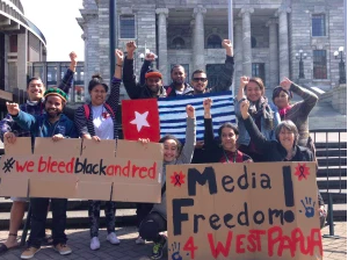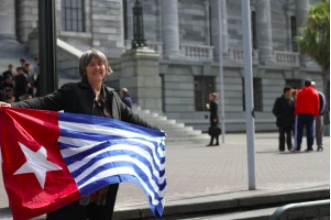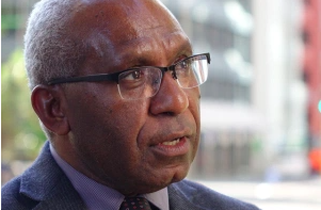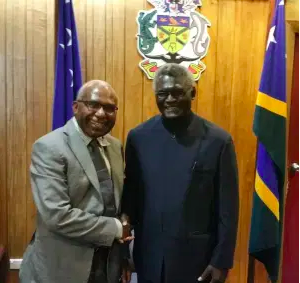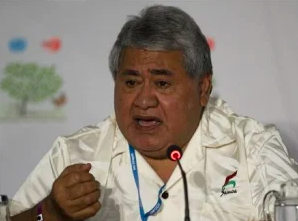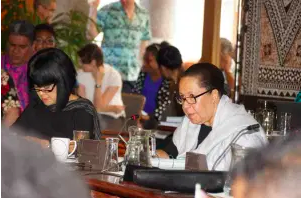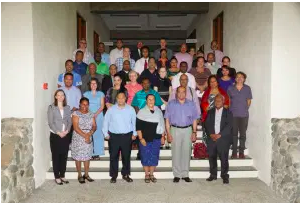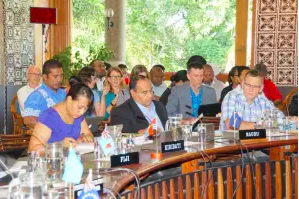OUR WEAVE |
|
By Lealaiauloto Aigaletaulealea Tauafiafi West Papua is one of five priority items confirmed for Pacific leaders to discuss and decide on a course of action when they meet in Papua New Guinea next month. A visit by a West Papuan leader last week to Wellington failed to jiggle New Zealand’s position out in the open. A view to the government’s position heading to the leaders’ summit would have been invaluable for West Papua’s freedom movement as it calls on Pacific leaders to set up a fact-finding mission to send to Indonesia. If leaders agree, it would be a major step forward in the Melanesian population’s 40-plus year fight for political recognition as the way to restore their independence and fundamental right to self-determination. Mr Octovianus Mote, the head for the United Liberation Movement for West Papua (ULMWP) was in Wellington last week hoping to get a view to the New Zealand government’s position, whether it would support West Papua’s call for a fact-finding mission. “West Papua has had 53 years of human rights violations and there is an ongoing genocide. There are so many academic reports and human rights reports about it,” said Mr Mote. “We are really calling for the Forum to form a fact-finding commission and to conduct a human rights assessment of West Papua.” But even though Mr Mote spoke at the Beehive last week at a function organised by the Green party, there was a lack of government representation and the overwhelming silence on West Papua failed to shine a light on the government’s possible stance. Even a list of Pacific Guardians queries on the West Papua issue sent to Pacific Peoples minister Peseta Sam Lotu-I’iga failed to get a response. It indicates the high level of sensitivity around multiple issues likely to be thrashed out by leaders at the PNG summit such as the watered down climate change positions for both New Zealand and Australia; the calls by Fiji for New Zealand and Australia to resign from the Forum ensuring a tinder box environment heightened by the inclusion of West Papua and Indonesia in the mix, especially with host PNG supporting West Papua. However, Labour’s Pacific spokesperson, Su’a William Sio told Pacific Guardians that a conversation he had with National MP Alfred Ngaro Friday last week indicates that the government has “taken up a position [on West Papua]”. “As co-chair of the multiparty Parliamentary Friendship Group, I have spoken to Alfred that I would like someone from the region to come and speak to parliamentarians on the issue of West Papua. Alfred said he can get someone from the Ministry of Foreign Affairs. I said that’s fine but we also need a Pacific person from the region,” Su’a said. “But Alfred’s answer, confirming that someone from Foreign Affairs can present to the group indicates to me that the government has taken up a position.” Su’a did not confirm when the West Papua presentation is likely to take place – that he’s asked Green MP and West Papua advocate Ms Catherine Delahunty to find a Pasifika speaker from the region to speak to the group. Su’a added, “We are also caught up in our own issues that I’m sure most people in New Zealand will not believe that there is still this kind of goings in West Papua in this day and age – that the Indonesian government is allowing this kind of behavior to go on and the Western world does not seem to take notice.” INFORMATION ABOUT WEST PAPUA SITUATION West Papua has been subjected to a brutal repression by the Indonesians since 1962. Prior to that, the island of New Guinea (the eastern half now known as Papua New Guinea and the western half now known as West Papua) as well as Indonesia had been Dutch colonies until Indonesia’s own war of independence in 1949. In 1936 while still under Dutch rule an erstberg (ore mountain) was discovered in the southwest region of New Guinea, and in 1959 alluvial gold was found just off the West Papuan coast. Another massive ore mountain was yet to be discovered deep in the West Papuan forest. In the 1950s, plans were made by the Dutch to prepare for withdrawal including plans for West Papua to revert to indigenous rule by 1972. Despite a West Papuan congress on independence in 1961 and the raising of the national “Morning Star” flag, Indonesia had claimed New Guinea as part of its territory. A United Nations intervention resulted in the New York Agreement in 1962 which placed the territory in UN trusteeship (without consent of the population) and required that West Papuans hold an independence vote under UN supervision. But by the time the vote was conducted in 1969 the Indonesian military had handpicked 1,026 representatives to vote on behalf of the entire population. Having been threatened with the death of their families the vote was unanimous for Indonesian rule. The so-called “Act of Free Choice” is known to this day by indigenous West Papuans as the “act of no choice.” When the West Papuans were making plans for independence in 1961, unbeknownst to either they or the Dutch, then-Indonesian army general Suharto was negotiating a mining deal with the American mining company Freeport-McMoRan Copper and Gold. Subsequent discoveries resulted in the notorious Grasberg mine one of the largest reserves of copper and gold in the world—and is today at the center of the conflict between Indonesia and West Papua. The Free West Papua Movement claims that over 500,000 civilian West Papuans have been killed to date. Source: Pacific Guardians
0 Comments
After six year, the issue of West Papua will surfaced again at the regional Pacific islands leaders’ forum. The last time the key regional political unit of the Pacific talked about West Papua was back in 2009 during the 40th Pacific islands forum (PIF) which took place in Cairns, Australia. During that forum, there was lobbying for West Papua to be given observer status, and there was also was small talk amongst leaders to consider the idea. In past years, the forum has noted its concern about the growing human rights abuses in West Papua. However, the 40th PIF communiqué had no mention of West Papua because of pressure from Australia to keep it off the forum’s agenda. This time around the 46th Pacific leaders’ forum scheduled from the 7th to the 11th of September in Port Moresby (Papua New Guinea) will challenge our island leaders. The issue of West Papua is one of top five priority issues on the leader’s agenda. The challenge remains for the region’s top players such as PNG and Fiji who share the same foreign stance as Australia and New Zealand, respecting the sovereignty of Indonesia.
The United Liberation Movement for West Papua (ULMWP) together with solidarity groups in the Pacific including Australia and New Zealand are calling on our leaders to send a human rights fact finding mission to West Papua. The ULMWP’s Secretary General, Octovianus Mote, said he is hoping our Pacific leaders will not object this humanitarian fact-finding mission. Mr Mote told Radio New Zealand International recently that the mission must seek an independent, multi-disciplinary group. “So, not only government delegations but really with human rights experts, journalists, so it can really dig into what’s happened in West Papua in the past 53 years. Otherwise, we West Papuans are crying for the creeping genocide that’s taking place.” Vanuatu and the Solomon Islands have made known their support for West Papua. Current chair of the Melanesian Spearhead Group (MSG), Prime Minister Manasseh Sogavare said the Solomon Islands Government has appointed a special envoy on West Papua to look into regional and international issues relating to West Papua. Prime Minister Tuilaepa Sa’ilele Malielegaoi has also made the assurance to the ULMWP that Samoa will be supporting West Papua’s plea. Five top priority issues will now make the agenda for the Pacific Island Leaders’ summit in Port Moresby, PNG, next month. Pacific Islands Forum Secretariat has presented the five priority issues for leaders to address in regards to greater regionalism. The issues were identified by the recently created Specialist Sub-Committee on Regionalism and have been presented to the Forum Officials Committee who met in Suva last week. Sub-Committee called for public proposals and received 68 proposals.
PIF Secretary General Dame Meg Taylor says the issues raised reflected community expectations of the role Forum leaders could play. The five issues are increased economic returns from fisheries and maritime surveillance; climate change and disaster risk management; information and communication technology; West Papua and cervical cancer. |
AuthorYoungsolwara Pacific Archives
June 2019
Categories |
